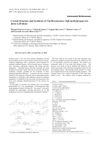 2 citations,
January 2015 in “Springer eBooks”
2 citations,
January 2015 in “Springer eBooks” Environmental factors and exposure to toxins may contribute to male infertility by affecting sperm and hormone function.
 18 citations,
August 2017 in “PLOS ONE”
18 citations,
August 2017 in “PLOS ONE” Skin and its underlying fat layer act together to resist mechanical stress, and reinforcing this composite structure may help more with anti-aging than just strengthening the skin alone.
5 citations,
September 1980 in “International Journal of Dermatology” Understanding hormones is key to treating certain skin conditions.
 January 2019 in “Paëmi Sino”
January 2019 in “Paëmi Sino” Women with keloid scars often have acne and hair loss, especially those with "true" keloids, indicating a possible hormonal imbalance.
 December 2024 in “Frontiers in Endocrinology”
December 2024 in “Frontiers in Endocrinology” Continued research and awareness are needed to improve treatments for androgen-dependent diseases.
 3 citations,
September 2016 in “Natural Product Communications”
3 citations,
September 2016 in “Natural Product Communications” Germacrene analogs, especially 8-Hydroxy germacrene B, are more effective than germacrone at blocking a hormone-related enzyme and could help treat hair loss.
 97 citations,
November 1986 in “Journal of Steroid Biochemistry”
97 citations,
November 1986 in “Journal of Steroid Biochemistry” Antiandrogens affect androgen-dependent body functions and are used for various medical conditions, with some risks like fetus feminization, but new forms like 17α-propylmesterolone show promise for acne without systemic effects.
 14 citations,
May 2012 in “Endocrine Research”
14 citations,
May 2012 in “Endocrine Research” The same hormone can affect gene expression differently in various tissues, which could lead to new treatments for conditions like hair loss.
 24 citations,
March 2003 in “Best Practice & Research Clinical Endocrinology & Metabolism”
24 citations,
March 2003 in “Best Practice & Research Clinical Endocrinology & Metabolism” Androgens, male hormones, play a role in both men and women's health, and testosterone therapy can help women with low levels, but it's not suitable for pregnant or lactating women, or those with certain conditions.
 23 citations,
December 2004 in “Differentiation”
23 citations,
December 2004 in “Differentiation” Sex hormones affect hair and feather growth and may help manage alopecia and hormone-dependent cancers.
 25 citations,
January 2000 in “Hormone Research in Paediatrics”
25 citations,
January 2000 in “Hormone Research in Paediatrics” Mutations in the androgen receptor gene cause Androgen Insensitivity Syndrome, affecting sexual development.
 1 citations,
January 2022 in “European Journal of Pharmacology”
1 citations,
January 2022 in “European Journal of Pharmacology” Riboflavin 5′-phosphate (FMN) shows potential for treating androgen-related conditions but may be limited in treating prostate cancer.
 2 citations,
October 2001 in “Analytical Sciences”
2 citations,
October 2001 in “Analytical Sciences” A new compound that could treat various androgen-related conditions was created and analyzed.
December 2024 in “Tissue and Cell” A new method helps detect androgen receptor movement in cells, aiding research on hair loss treatments.
 1 citations,
January 2013 in “MedChemComm”
1 citations,
January 2013 in “MedChemComm” PF-05314882 selectively activates androgen receptors without much effect on prostate and may help in prostate cancer treatment and hair loss prevention.
51 citations,
June 1970 in “British journal of dermatology/British journal of dermatology, Supplement” Antiandrogens may help treat conditions like excessive hair growth, prostate tumors, male baldness, and acne by blocking male hormone effects.
 7 citations,
December 2004 in “Medicine”
7 citations,
December 2004 in “Medicine” Knowing how skin works and its diseases helps doctors diagnose and treat skin conditions better.
 101 citations,
April 1994 in “Baillière's clinical endocrinology and metabolism”
101 citations,
April 1994 in “Baillière's clinical endocrinology and metabolism” 5α-reductase is essential for male sexual development and its inhibitors have potential in treating various conditions related to hormone action.
 11 citations,
January 2000 in “The Journal of Steroid Biochemistry and Molecular Biology”
11 citations,
January 2000 in “The Journal of Steroid Biochemistry and Molecular Biology” LY320236 is a strong blocker of two enzymes that change testosterone into dihydrotestosterone and might help treat conditions related to male hormones.
 September 2021 in “CRC Press eBooks”
September 2021 in “CRC Press eBooks” Alopecia areata incognita causes sudden hair thinning, responds well to steroids, and is more common in those with genetic hair loss conditions.
39 citations,
November 1990 in “The Journal of Steroid Biochemistry and Molecular Biology” Antiandrogens help treat hormone-related conditions in both men and women.
 44 citations,
March 2012 in “Fitoterapia”
44 citations,
March 2012 in “Fitoterapia” Germacrone from Curcuma aeruginosa may help treat conditions related to male hormones by blocking a specific enzyme.
74 citations,
November 1975 in “Archives of dermatology” Increased DHT formation in skin can cause hair loss, acne, and excessive hair growth, and antiandrogens might treat these conditions.
 29 citations,
January 1993 in “Dermatologic Clinics”
29 citations,
January 1993 in “Dermatologic Clinics” Certain medications and maintaining adequate iron levels can help manage women's hair loss.
 24 citations,
April 2007 in “European Journal of Pharmaceutics and Biopharmaceutics”
24 citations,
April 2007 in “European Journal of Pharmaceutics and Biopharmaceutics” Microparticles containing artocarpin extract could effectively treat hair loss and acne with minimal side effects.
13 citations,
January 2002 in “Clinics in dermatology” A mushroom extract might reduce hair loss and liver damage caused by certain chemotherapy drugs in animals.
12 citations,
December 2016 in “PubMed” Hirsutism involves excessive hair growth due to hormonal issues and can be treated with medication or surgery.
 July 2015 in “Cambridge University Press eBooks”
July 2015 in “Cambridge University Press eBooks” The document concludes that treatments for female hair loss and excess body hair are available, but managing expectations is important.
 159 citations,
July 2006 in “Endocrine Reviews”
159 citations,
July 2006 in “Endocrine Reviews” Estrogens significantly influence hair growth by interacting with receptors in hair follicles and may help regulate the hair growth cycle.
 January 2018 in “Elsevier eBooks”
January 2018 in “Elsevier eBooks” The document explains how male reproductive hormones work and affect the body.























